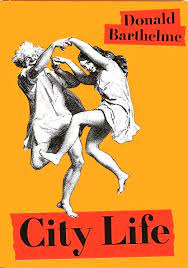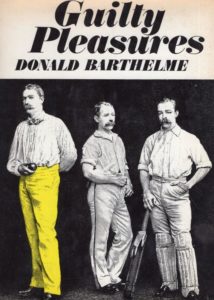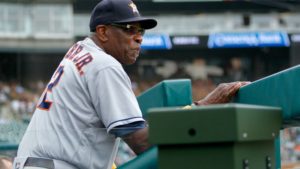November 3, 2021
Reading J.W. McCormack’s overview in the latest Baffler magazine of Donald Barthelme’s life and work while watching the sixth and final game of this year’s World Series added a thin, but pliable layer of poignancy to a bittersweet evening. I had by then finally decided after days of back-and-forth that I wanted the Astros, Don B’s hometown team, to at least take the Braves to a seventh game, if not (necessarily) Win It All. Part of it was about redemption for the Space Cowboys’ dismal and now apparently embedded reputation for cheating their way to a 2017 championship.
Mostly I was rooting hard for their manager Dusty Baker, who at 72 may be past hope of smelling the metaphoric roses but will likely be remembered as the kind of manager who took unruly, star-crossed and/or degraded franchises and got them to stand upright enough to move forthrightly towards Ultimate Victory. He likewise fell short with the Giants, Cubs and Nationals, all of whom would, in time, reach the promised land without him. While I wasn’t altogether sorry to see the Braves bathing in champagne (paternal family ties to the state of Georgia, plus which they ended up being my late mother’s favorite baseball team) their triumph left a taste of melancholy; an altogether suitable context when reading about Barthelme’s Houston roots, since as his old pal Thomas Pynchon once wrote of him, melancholy was at the core of Don B’s exotic, eccentric body-of-work. Quoth Tom P:
“As any Elizabethan could tell you if they all weren’t dead, melancholy is a far richer and more complex ailment than simple depression. There is a generous amplitude of possibility, chances for productive behavior, even what may be identified as a sense of humor. Barthelme’s was a specifically urban melancholy, related to that look of immunity to joy or even surprise seen in the faces of cab drivers, bartenders, street dealers, city editors, a wearily taken vow to persist beneath the burdens of the day and the terrors of the night. Humor in these conditions leans toward the anti-transcendent — like jail humor and military and rodeo humor, it finds high amusement in failure and loss, and it celebrates survival one day, one disaster, to the next.”
Put another way, it’s the kind of melancholy that accommodates conflicted emotions, whether they come through winning while losing, loving while hating, or resisting while enduring: a natural progression (a musical analogy that Barthelme the jazz hound would appreciate) to the off-off-year election results that yielded a Democratic loss of the Virginia gubernatorial election and an apparent stand-off in the New Jersey gubernatorial race. I knew last night that it was a mistake to switch from the Series’ postgame festivities to CNN for the latest vote tallies, further eroding my mood and devastating prospects for a good night’s sleep. What depressed me weren’t the results so much as the exasperating inevitability of “post-game assessments” by the punditocracy: “Uh-oh. Looks like BIIIIG trouble for President Biden, Nancy!” “How right you are, Cliff! This is clearly a referendum on the administration and the early returns look pretty bad for Biden and the Democrats!” “Yes, they should take a page out of Ronald Reagan’s winning formula and reach out to the disaffected white middle-and-lower-middle classes and blather-cliché-platitude-placate-pander-pander-pander …”
Nobody asked me, but (thanks once again, Jimmy Cannon) I don’t think any of this is Joe Biden’s fault. Or at least it’s not entirely Joe Biden’s fault. In fact, the president seemed to have had, despite some mishaps along the way, a pretty good week in Europe, patching up leaks, reasserting leadership in the climate crisis and generally staying upbeat as is and has been Joe’s way, whatever the situation or the odds. But however pugnaciously he keeps insisting otherwise, #46 isn’t close to getting “moderate” and “progressive” members of his own party on the same page with what seems to any rational human being his vitally needed package of economic-recovery expenditures. Placating those who holler “Socialism!” or (a euphemism I’ve decided I hate now more than any other) “Critical Race Theory!” at them seems to be the Democratic game plan, along with giving the billionaire senator from West Virginia a far bigger public profile than he or anybody else requires.
White Guys, in other words, are The Solution as far as the political establishment and their media enablers are concerned. And yet, candidates-of-color (including one woman) triumphed in mayoral races in Pittsburgh, Boston, and New York City. Cities are cities (especially in the northeast) and states are states. But did anybody in Virginia bother to consider what a candidate-of-color could have done in what experts insist is an increasingly blue state against a Trumpian mediocrity like Glenn Youngkin? Instead, the Democrats ran Terry McAuliffe, who was, besides being Another White Guy, a retainer from the Clinton years. Old news, as even the dimmest bulb in the political press corps could and should have suspected.
Some people think I lean too much on the wisdom of my late fellow worker Murray Kempton. But among his many wise observations was (and I paraphrase) that political success is most attainable by those who ally themselves to the future while bearing little to no responsibility to the past. “The past,” Murray once said in this context, “already has a job.” And yes, I know who’s president (for the time being). But Biden was smart enough back when the primaries were seemingly happening a million years ago to understand that his best chance to get nominated was to leapfrog his way to Black power brokers like Jim Clyburn and make them see that his years with Barack Obama allowed him to perceive as others didn’t the possibilities #44’s presence, if not his policies, signified for the party’s future. Whatever their respective ideologies, Eric Adams (basically as “moderate” as they come), Michelle Wu and Ed Gainey represent, at the very least, the chance for Something Different in their party than whatever came before, including, maybe especially, the Clinton era.
I’m willing to bet whatever pittance I’m carrying in my wallet that you’re not going to hear any Political Insider hired by television say such things. I refuse to take whatever these talking heads say seriously unless they are in any way familiar with the aggregate works of Albert Murray AND James Baldwin, Toni Morrison AND Grace Paley – and, of course, the aforementioned Donald Barthelme (had to get back to him), whose short fiction was once regarded as surreal, but I’ve lately come to believe was farsighted enough in the sixties, seventies and eighties to now comprise hyper-explicit accounts of our present-day reality. Writes McCormack: “[Barthelme] dwelt in the fissures of the conscious mind and made work that was neither one thing nor the other because it was both and neither…a trickster spirit…who took nonsense so seriously it congealed into wisdom, the effect of staring so deeply into the void that not only does it stare back, it becomes cross-eyed.”
Don’t take his word for it, or mine. You’ve got time. Look into him – and don’t be surprised if those stories we’re talking about look into you.


